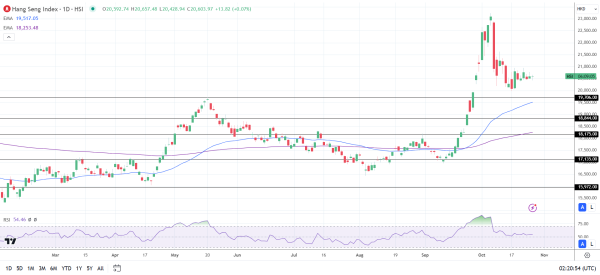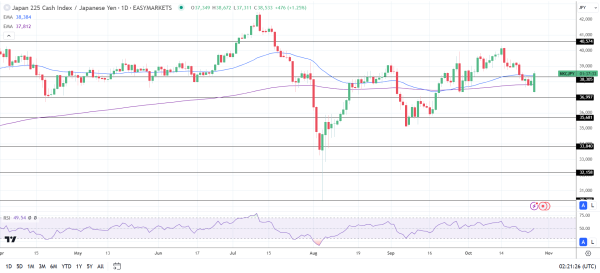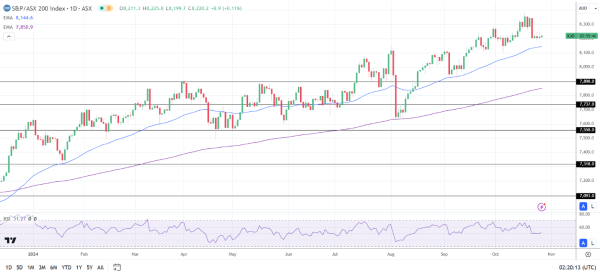Hang Seng and Nikkei 225: Markets React to US Economic Data and Japan Election Shock
US Markets: Nasdaq Ends the Week on a High Note
On Friday, October 25, US equity markets closed the week on a mixed note. The Nasdaq Composite Index extended its gains from Thursday, rising 0.56%. However, the Dow and the S&P 500 saw declines of 0.61% and 0.03%, respectively.
In the bond markets, 10-year US Treasury yields rose, testing demand for riskier assets.
US Economic Indicators Signal Soft Landing
On Friday, US durable goods and finalized Michigan Consumer Sentiment figures raised expectations for a soft US economic landing. Durable goods orders, excluding transport, increased by 0.4% in September after rising by 0.6% in August. Furthermore, the Michigan Consumer Sentiment Index climbed from 70.1 in September to 70.5 in October, up from a preliminary 69.0.
The upbeat data supported investor expectations of a soft US economic landing. However, the upbeat data also eased bets on a December Fed rate cut. According to the CME FedWatch Tool, the chances of a 25-basis point December Fed rate cut fell from 74.6% to 70.3%.
Japan General Election Shock
On Sunday, Japan’s Liberal Democratic Party (LDP)-Komeito coalition faced a shock result in the snap general election.
The ruling coalition party came up short of the 233 seats required for a majority. The LDP-led coalition will need to negotiate with smaller parties to form a government, which may require concessions. Political uncertainty and possible influences on the Bank of Japan’s rate path impacted buyer demand for the Japanese Yen.
On Monday, October 28, the USD/JPY pair was up 1% to 153.758, reflecting investor sentiment about the election result.
China Industrial Profits Signal Weakening Demand
Economic data from China signaled headwinds. From January to September, industrial profits declined by 3.5% year-on-year after increasing by 0.5% in August. The unexpected fall in profits aligned with recent trade data, also signaling weaker demand. China’s exports increased by just 2.4% year-on-year in September, down from 8.7% in August.
Despite recent stimulus efforts to support economic growth, concerns about China’s outlook persist.
On Thursday, IMF Managing Director Kristalina Georgieva reportedly warned China could see growth slow well below 4% without reforms to fuel domestic consumption. Georgieva held a similar view to Natixis Asia Chief Economist Alicia Garcia Herrero, who recently said,
“Beijing could deploy as much as 6 trillion yuan ($842.9 billion) in new fiscal stimulus, but the fund will be more of a ‘risk package’ to recapitalize banks, clean up sold but unfinished housing units and ease local governments’ hidden debt. This is to solve the deflationary pressure, not to stimulate consumption yet.”
Hang Seng Index and Mainland China Have a Mixed Start to the Week

In Asian markets, the Hang Seng Index gained 0.07% on Monday morning. Investors likely grappled with the latest data from China and hopes of stimulus to boost consumption. Real estate and tech stocks advanced, contributing to the gains.
The Hang Seng Mainland Properties Index gained 0.87%, while the Hang Seng Tech Index advanced by 0.99%. Leading tech stocks included Alibaba (9988) and Baidu (9888), which rose by 1.78% and 1.09%, respectively.
Mainland China’s equity markets had a mixed morning session amid concerns about China’s economic outlook. The CSI 300 declined by 0.36%, while the Shanghai Composite edged up 0.01%.
Nikkei Rallies on USD/JPY Return to 153

Meanwhile, the Nikkei Index rallied 1.61% on Monday morning. Weaker demand for the Japanese Yen countered concerns about a political impasse in Japan, driving demand for Nikkei-listed export stocks. Notably, Bank of Japan plans for monetary normalization could also be in jeopardy, supporting the Nikkei’s gain.
Nissan Motor Corp. (7201) and SoftBank (9984) rallied 3.46% and 3.06%, respectively, while Tokyo Electron (8035) advanced by 2.95%.
ASX 200 Advances on Mining Stock Gains

The ASX 200 Index gained 0.11% on Monday morning. Mining and tech-related stocks led the gains, countering gold and oil-related stock losses.
Mining giants stocks BHP Group Ltd (BHP) and Rio Tinto Ltd (RIO) rallied 1.12% and 1.46%, respectively. Iron ore spot prices surged by 2.69% on Friday and extended its gains on Monday morning, boosting demand for mining stocks. Additionally, the S&P/ASX All Technology Index advanced by 1,11%.
However, gold-related stock Northern Star Resources (NST) slid by 4.32%, while Woodside Energy Group (WDS) declined by 0.58% on falling oil prices. Easing fears of an escalation in the Middle East conflict sent oil prices tumbling on Monday. WTI crude was down 4.58% to $68.49.
Looking Ahead
Investors should remain vigilant. Fiscal stimulus-related news from China, updates on Japan’s general election, and central bank commentary could affect market risk appetite. Additionally, US Treasury yields and futures will likely influence market risk sentiment.